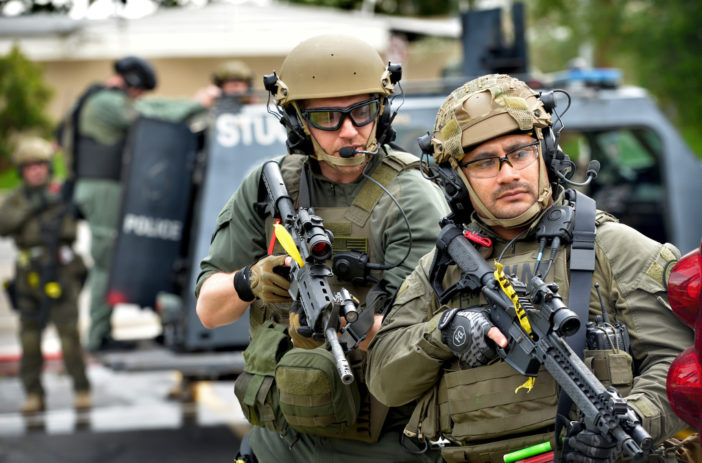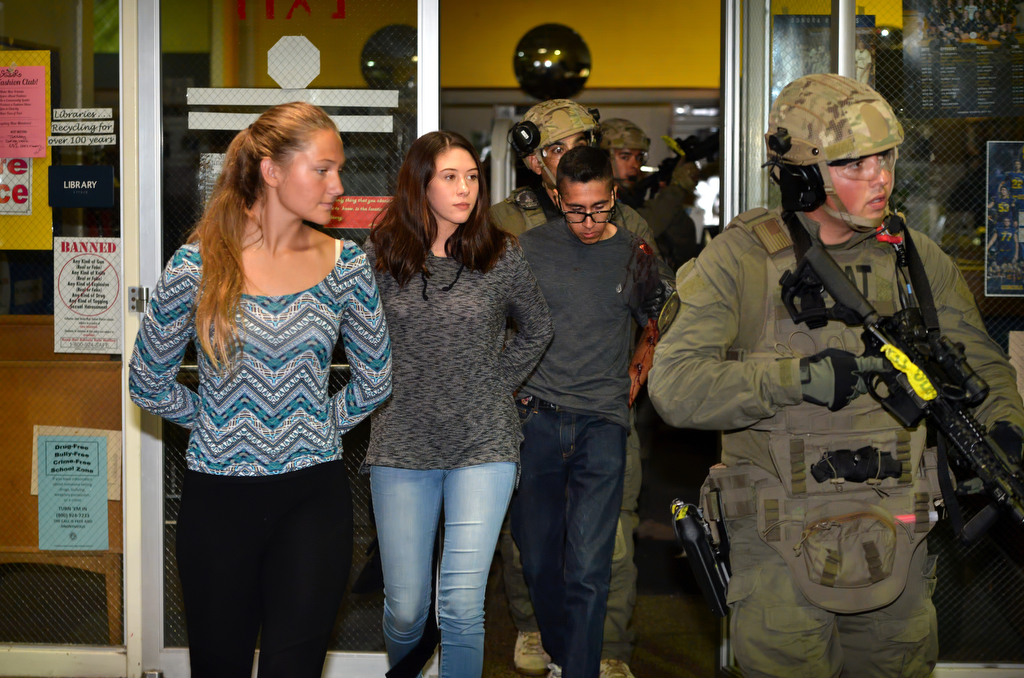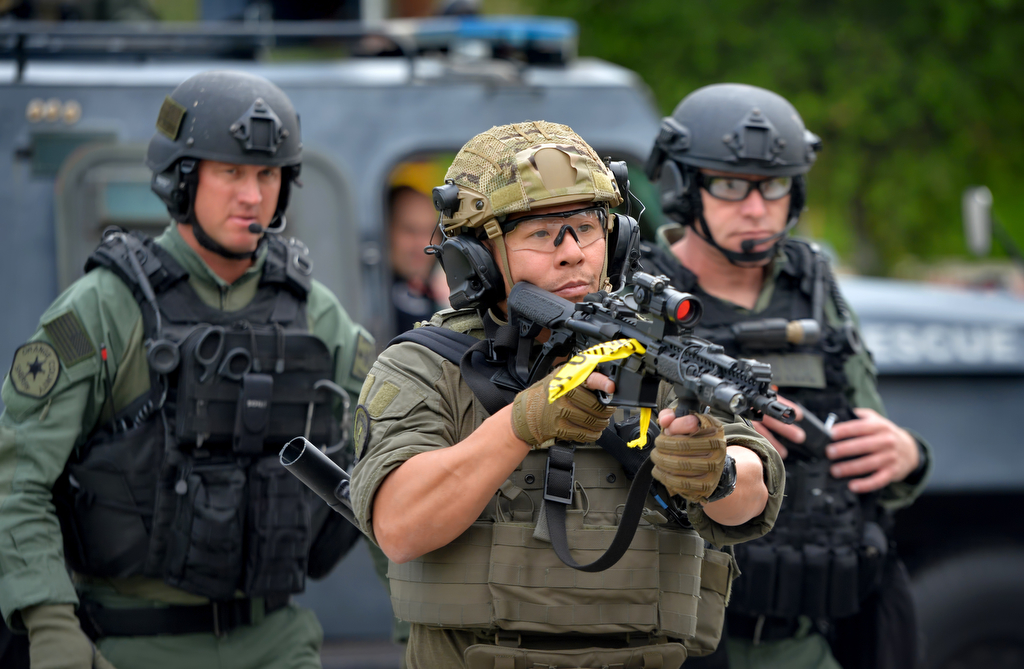They arrived to the campus with their guns drawn and little information.
Smoke filled the foyer of Sonora High School and slowly billowed out the front doors as fire alarms flashed and blared.
Several teens lay on the floor bleeding. Some screamed for help, while others slumped against walls silent and unresponsive.
As the La Habra patrol officers entered, they called out for information.
How many shooters? What does the shooter look like? What kind of firearm?
None of the victims were any help.
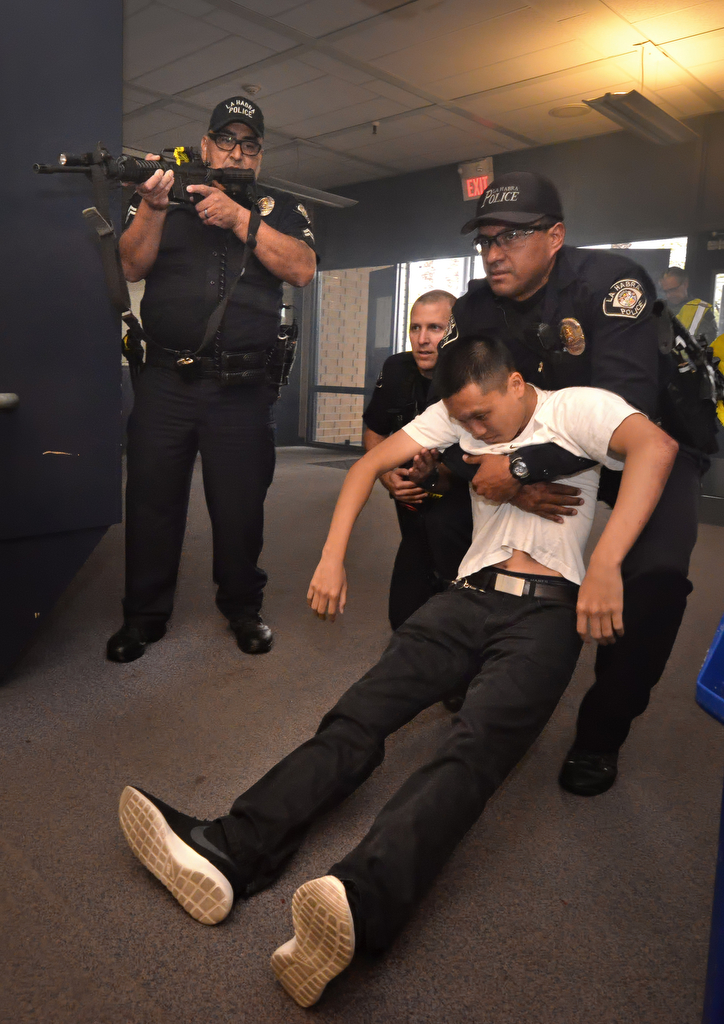
La Habra PD Officer Eliseo Funes removes people acting as the wounded during an active shooter drill at Sonora High School.
Photo by Steven Georges/Behind the Badge OC
Meanwhile, La Habra dispatchers worked furiously on their end, trying to gain any intel they could.
They found the Facebook profiles of a man, who potentially was the mastermind behind the attack, and his four accomplices — all high school students.
As the dispatchers worked for information, patrol officers dragged victims to the front of the school so that Los Angeles County Fire personnel could provide medical aid.
The North County SWAT team arrived minutes later and staged outside the school, devising a plan to make entry, then methodically clearing the hallways of the school.
Members of the Orange County Sheriff’s Department Bomb Squad followed behind SWAT, tending to several improvised explosive devices found on campus.
Then the sound of gunfire summoned one of the SWAT tactical teams to the library, where they learned they had the suspect cornered.
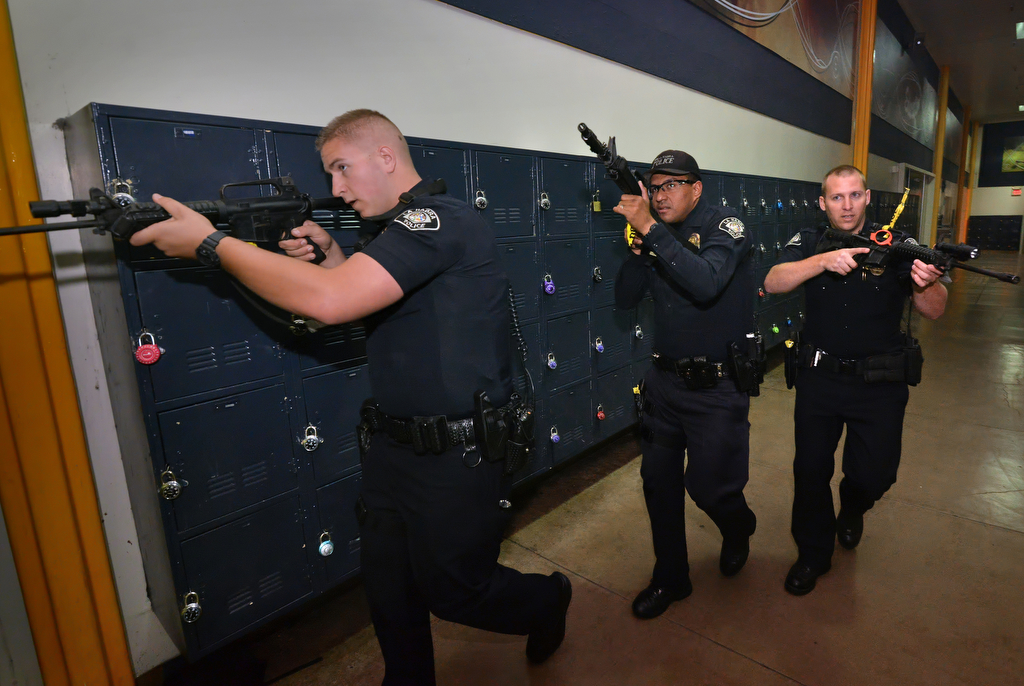
La Habra PD officers check out the hallways and room after room during an active shooter drill at Sonora High School.
Photo by Steven Georges/Behind the Badge OC
The suspect had barricaded himself and grabbed a couple hostages as insurance.
Negotiators were called to the scene to work on getting everyone out safely.
A little more than four hours after the initial call, the suspect was arrested.
There had never been anything like this in La Habra’s history and lucky for everyone this was only a test.
The La Habra Police Department, on March 28, staged the elaborate, multi-agency training scenario at the high school to be as prepared as possible should tragedy strike.
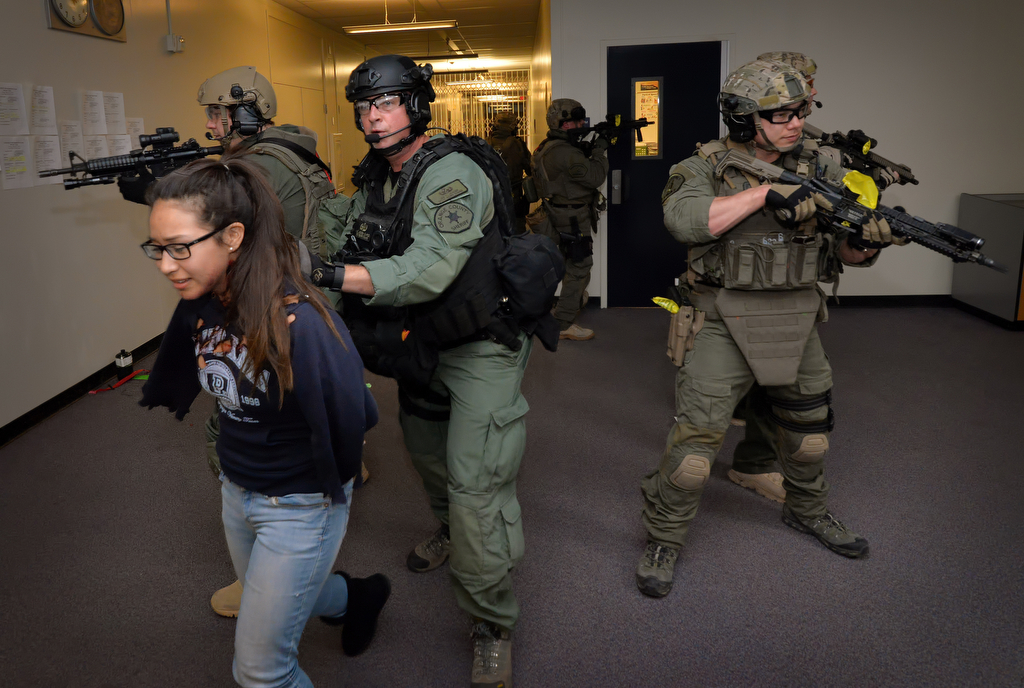
North County SWAT officer from the Orange County Sherif Dept. safely removes a woman acting as a wounded student during an active shooter drill at Sonora High School.
Photo by Steven Georges/Behind the Badge OC
Lt. Dean Capelletti and Sgt. Adam Foster, both members of La Habra PD and North County SWAT, spent dozens of hours drawing on documented examples of active shooter and hostage incidents to stage the scenario.
“We looked at what has happened in the real world, such as Columbine, and applied it here,” Capelletti said. “Our police department is determined to provide the safest environment for our community’s schools and the fastest most effective response to any incident.”
“What we’ve done is tried to make the scenario as realistic as possible.”
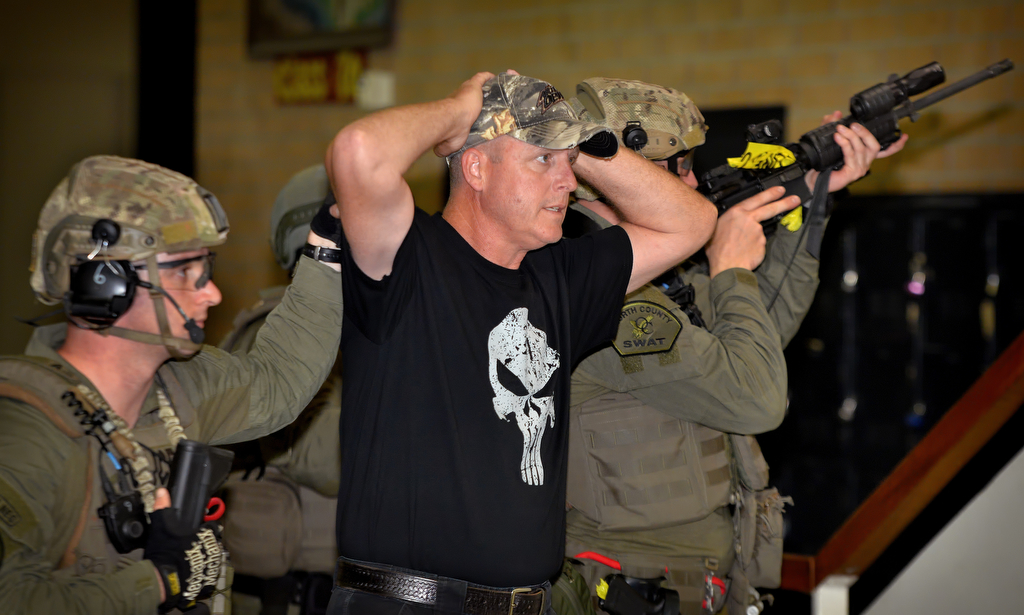
Playing the suspect, La Habra Community Services Officer Ken Gustin is led out of the upstairs room he was hiding out by North County SWAT in during an active shooter drill at Sonora High School.
Photo by Steven Georges/Behind the Badge OC
North County SWAT (NCS)— made up of officers from La Habra, Fullerton, Brea, Placentia, Cal State Fullerton, and La Palma police departments — trains regularly on a variety of scenarios, but this was the first time they employed such a complex, multi-faceted experience in La Habra.
La Habra PD, LA County Fire, Buena Park PD SWAT, OCSD Bomb Squad and the NCS SWAT team were all on the ground and working together to test their communication skills and improve the fluidity of their tactics.
“We are expecting there to be some hiccups and we want that to happen,” Capelletti said, before the exercise got under way. “We recognize the greatest challenge will be with communications. This training will help us to identify issues in training, to improve our real-world responses.”
Police Explorers from across the county, including Westminster and Irvine, acted as student victims, complete with realistic-looking injuries crafted with makeup applied by professional makeup artists, with help from students of the Sonora drama department.
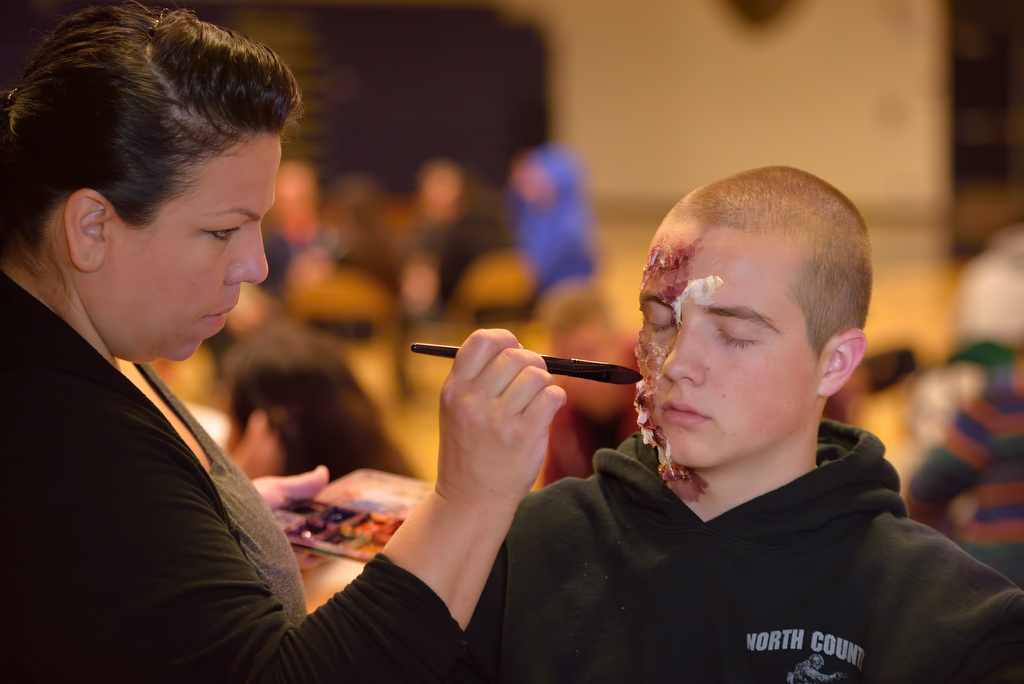
Lead makeup artist Denise Chavez paints the simulated injuries to the face of Dylan Marshall, an explorer from Brea PD, before the start of an active shooter drill at Sonora High School.
Photo by Steven Georges/Behind the Badge OC
Members of Anaheim PD’s SWAT team served as third-party evaluators, giving feedback on what went right and what improvements could be made.
“Improving communication was the main thing we wanted to work on, and it got better, as the scenario went on,” Capelletti said. “We also wanted to point out how to use technology to your advantage.”
“When it comes to identifying potential suspects, our operators, dispatchers and negotiators have access to tools like social media, but when you don’t use them often, you forget that they’re there.”
Running the training helps create something Capelletti likened to muscle memory that police and fire can call upon should they ever need those skills in the future.
“They now have experiences to draw from, which reduces their reaction time,” Capelletti said. “There is no one PD that can handle a situation of this magnitude by itself. In the end, all emergency personnel just want to provide the best service to the public”
“We work with each other and we need each other’s help.”
And looking for help to prompt a swift public safety response goes beyond emergency personnel, Capelletti added.
“We really need the public’s assistance with reporting anything they see that is suspicious,” he said. “There is nothing too small or too insignificant.”
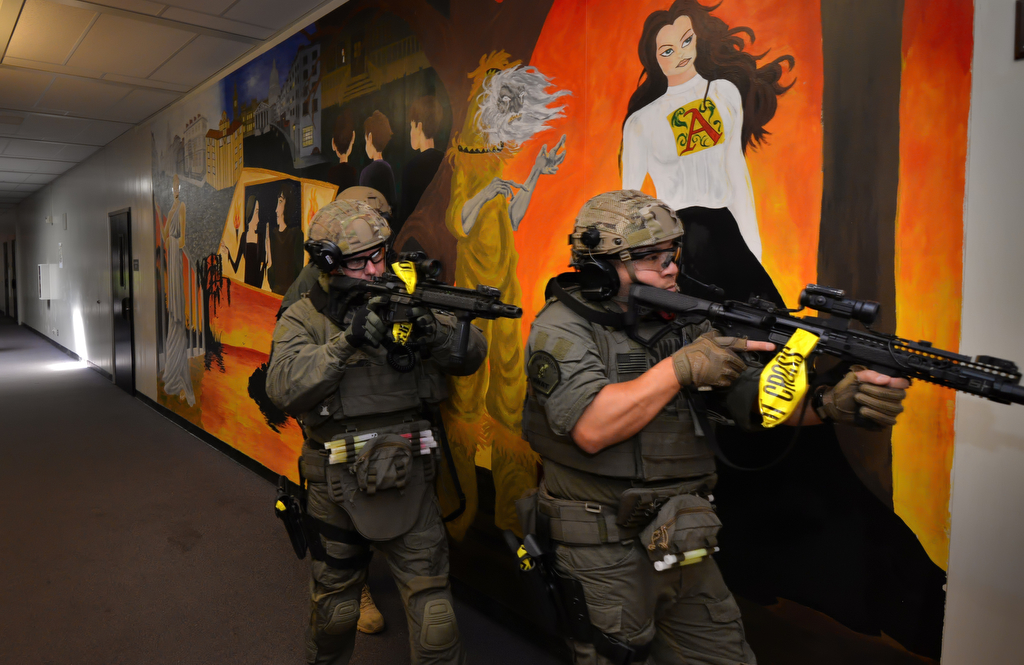
North County SWAT officers walk down the hallway of Sonora High School as they clear room after room during an active shooter drill. The yellow tape on the guns signifies that they have been checked and cleared to carry as an unloaded weapon.
Photo by Steven Georges/Behind the Badge OC
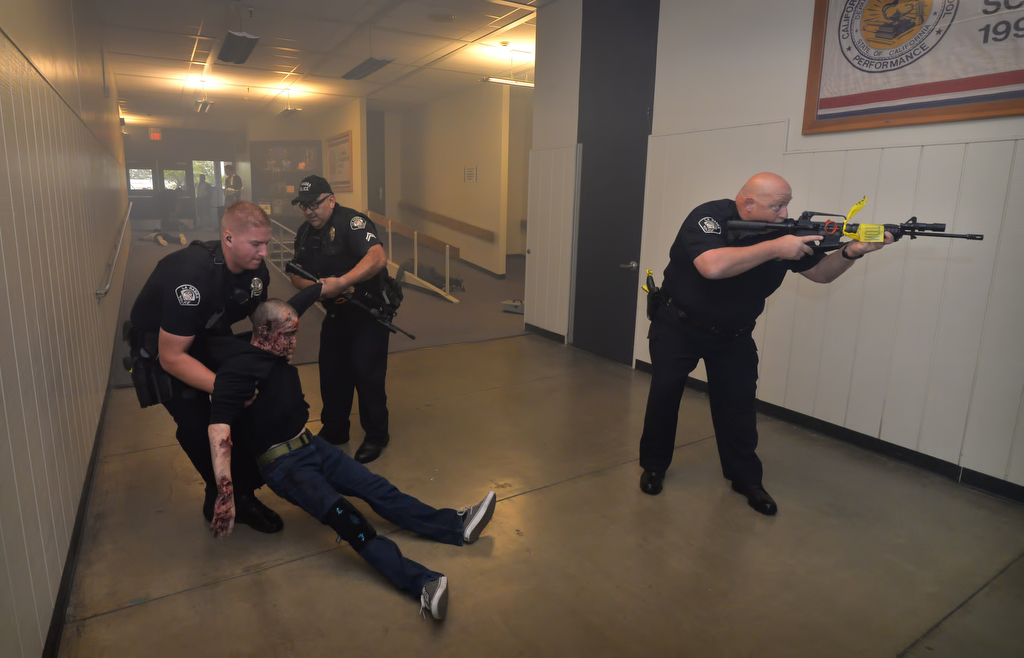
La Habra PD officers remove the acting wounded and clear the hallway during an active shooter drill at Sonora High School.
Photo by Steven Georges/Behind the Badge OC
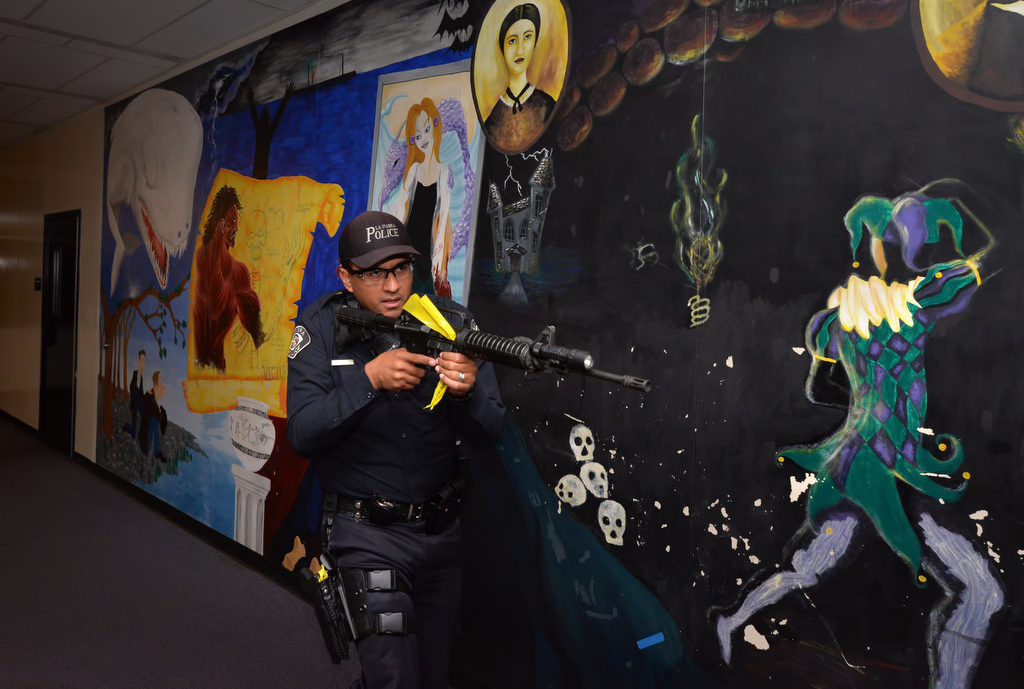
La Habra PD Officer Eliseo Funes walks the halls of Sonora High School during an active shooter drill.
Photo by Steven Georges/Behind the Badge OC
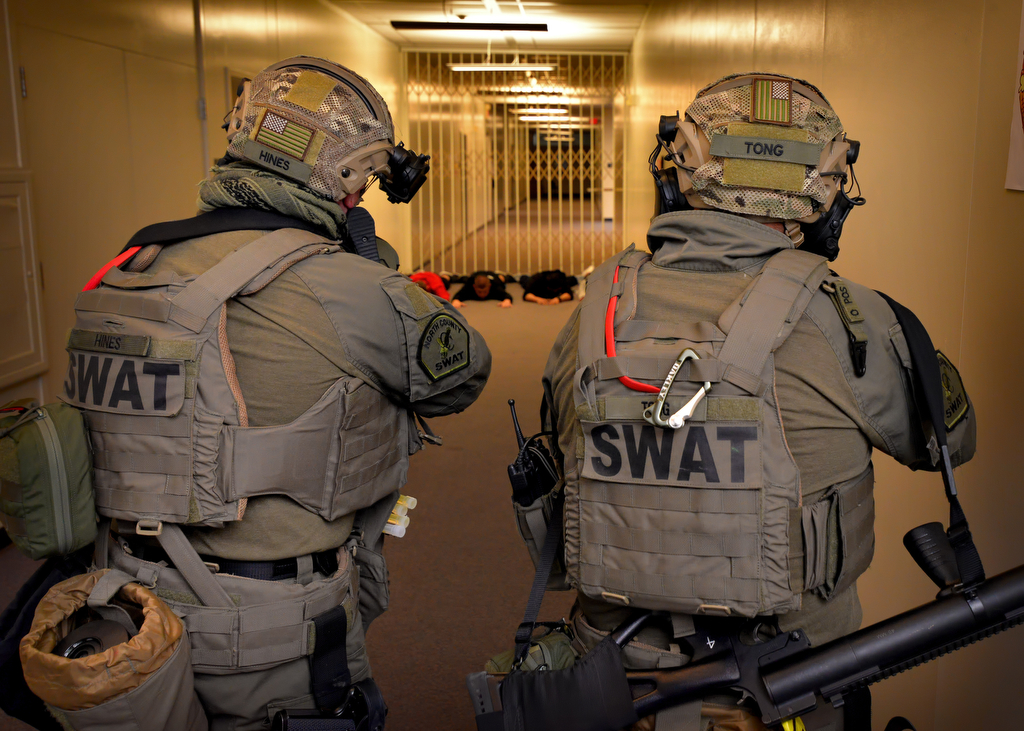
North County SWAT officers Sgt. Michael Hines, left, and Officer Cary Tong of Fullerton PD secure a hallway with acting students at Sonora High School during an active shooter drill.
Photo by Steven Georges/Behind the Badge OC
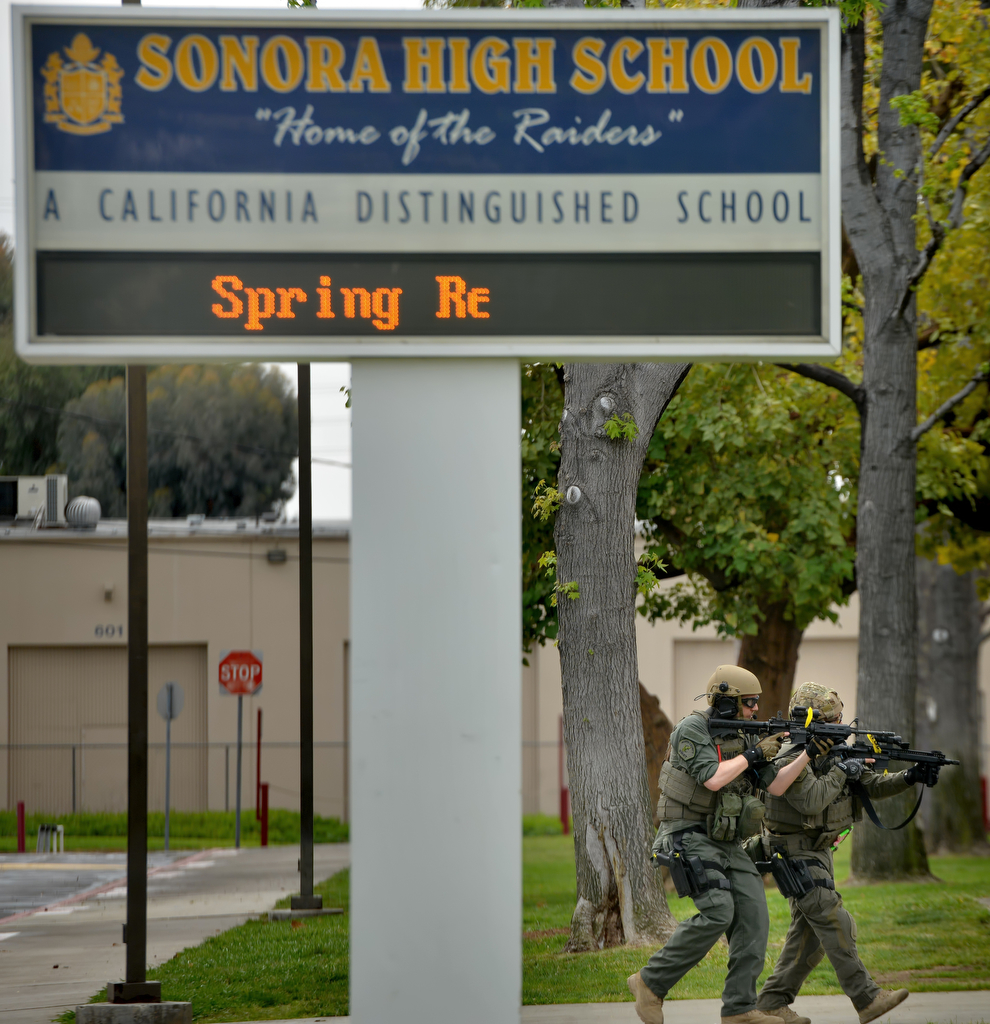
North County SWAT officers conduct a drill at Sonora High School in La Habra.
Photo by Steven Georges/Behind the Badge OC
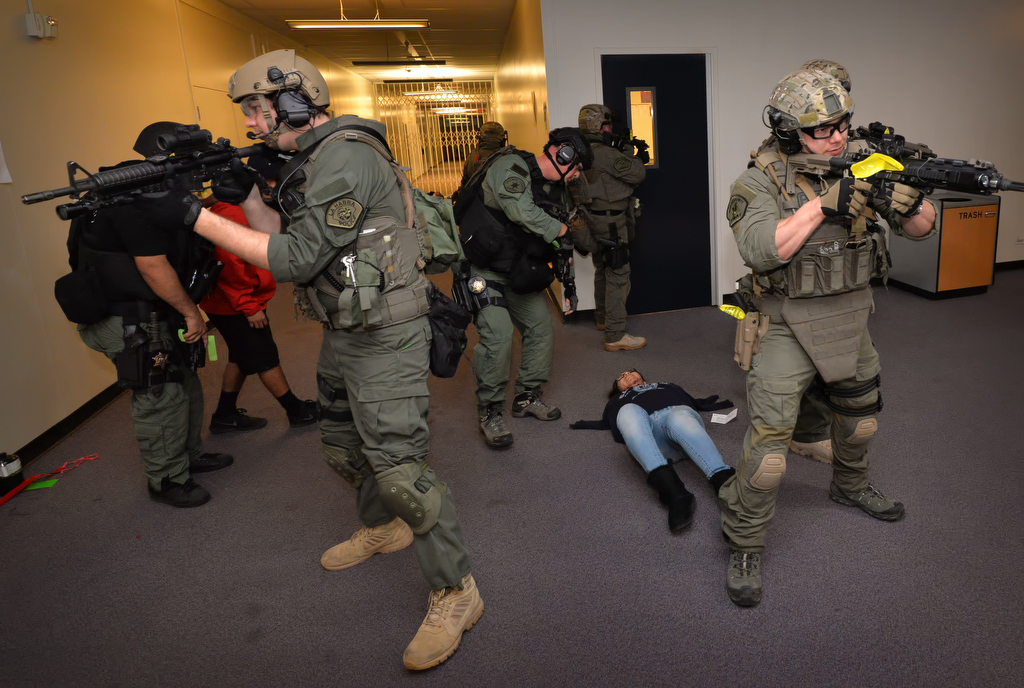
North County SWAT member and La Habra Det. Daniels, left, stands guard as members of his team clear rooms at Sonora High School. Photo by Steven Georges/Behind the Badge OC
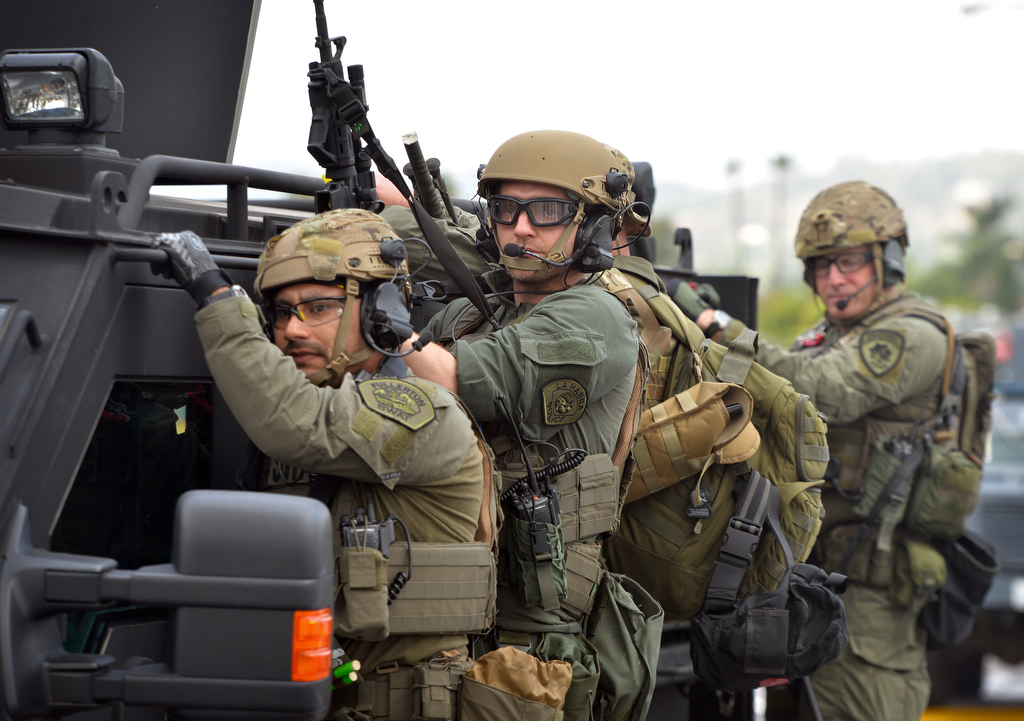
North County SWAT officers move in during an active shooter drill at Sonora High School.
Photo by Steven Georges/Behind the Badge OC
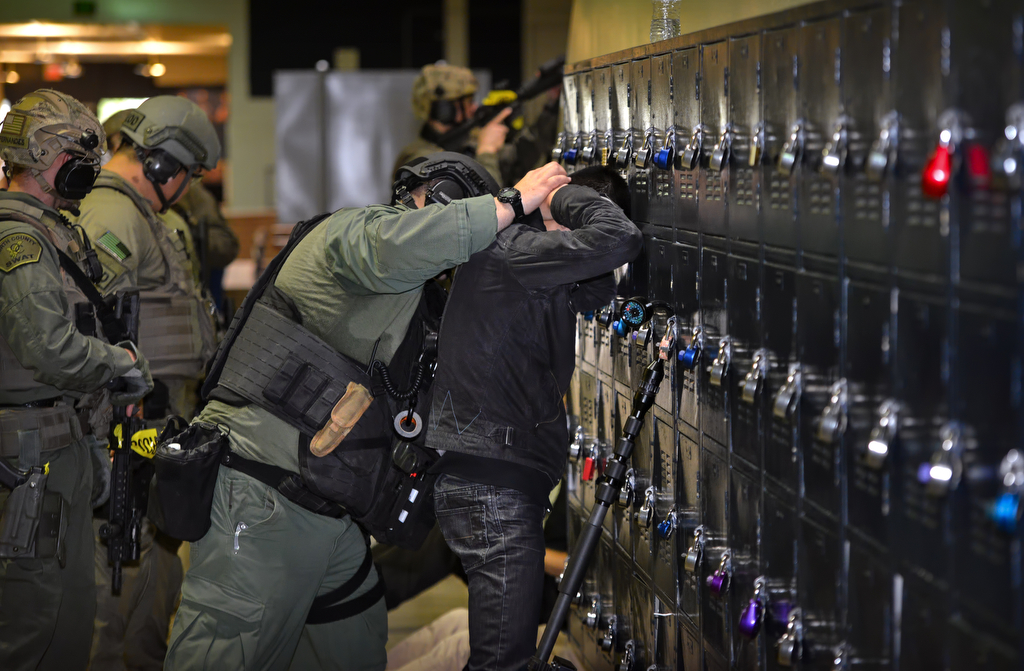
Taking no chances that a suspect may be hiding among the victims, people rescued from a room are searched before being led out of the danger zone during an active shooter drill at Sonora High School.
Photo by Steven Georges/Behind the Badge OC
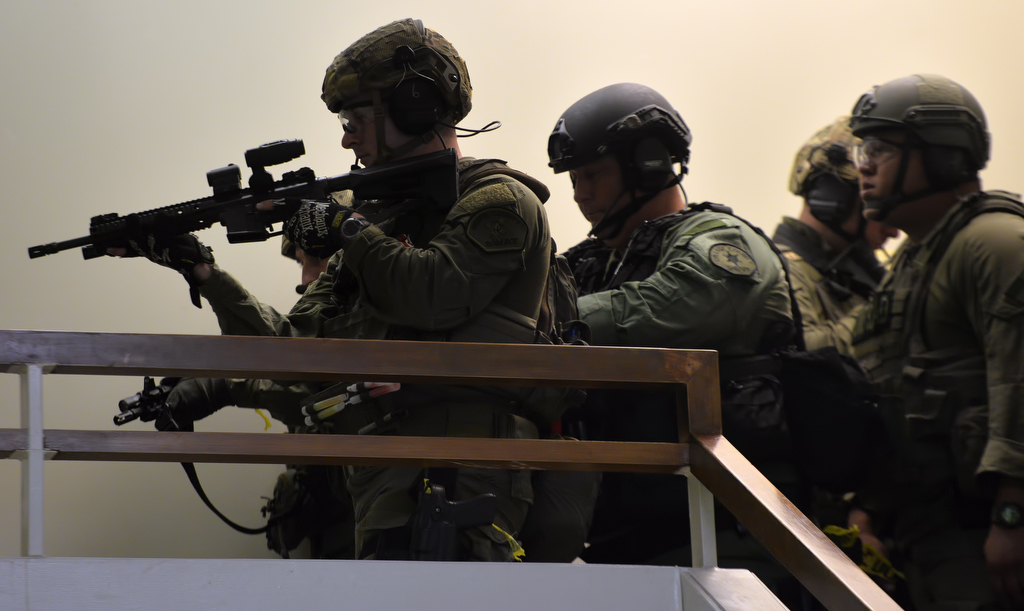
Members of North County SWAT approach a room where the bad guy is held up during an active shooter drill at Sonora High School.
Photo by Steven Georges/Behind the Badge OC
 Behind the Badge
Behind the Badge
